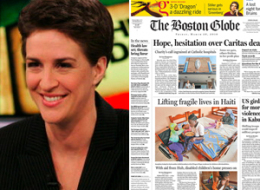Women and Economic Recovery
Senior women financial officials in the Obama administration talked about their careers, obstacles they’ve overcome, and what they’d like to see in financial reform. Treasury Secretary Timothy Geithner made opening remarks.
AGENDA: 10:00 AM EDT Treasury Secretary Tim Geithner, Treasurer Rosie Rios Welcome and Overview
10:15 AM WOMEN DRIVERS OF THE ECONOMIC RECOVERY: PATHWAYS TO SUCCESS
Moderated by Maria Bartiromo, CNBC Panelists: Federal Deposit Insurance Corporation Chairman Sheila Bair, Securities and Exchange Commission Chairwoman Mary Schapiro, Council of Economic Advisers Chairman Christina Romer, Small Business Administrator Karen G. Mills Congressional Oversight Panel Chair Elizabeth Warren
11:20AM THE LANDSCAPE AND CHALLENGE FOR WOMEN IN FINANCE Moderated by Liz Claman, FOX Business Network Panelists: President of the American Council on Education Molly Broad, Senior U.S. Investment Strategist for Goldman Sachs Abby Joseph Cohen, Director in the Strategic Client Group of Morgan Stanley Carla Harris, CEO of Citi Personal Wealth Management Deborah McWhinney President’s Economic Recovery Advisory Board member Laura Tyson
12:30 PM WORKING BREAKOUT LUNCHES: SOLUTIONS AND SUCCESS STORIES (Closed to Cameras No recording devices for broadcast purposes will be allowed.)
1:30 PM WHITE HOUSE ROLE IN SUPPORT OF WOMEN Senior Advisor and Assistant to the President Valerie Jarrett
1:45 PM CLOSING REMARKS Treasurer Rosie Rios
Landscapes and Challenges for Women in Fianance
11:20AM
THE LANDSCAPE AND CHALLENGE FOR WOMEN IN FINANCE Moderated by Liz Claman, FOX Business Network Panelists: President of the American Council on Education Molly Broad, Senior U.S. Investment Strategist for Goldman Sachs Abby Joseph Cohen, Director in the Strategic Client Group of Morgan Stanley Carla Harris, CEO of Citi Personal Wealth Management Deborah McWhinney President’s Economic Recovery Advisory Board member Laura Tyson
Closing Remarks and Valerie Jarrett
On Monday, March 29, 2010, at 10:00 AM EDT, the U.S. Department of the Treasury, in partnership with The White House Council on Women and Girls, will convene a Women in Finance Symposium in celebration of Women's History Month. The symposium will bring together senior administration officials, private sector leaders, university presidents and women entering the field for a series of panel discussions to recognize the contributions of women and to discuss the best means to foster success among future generations of women in the public and private finance sectors.
Event Offers Unique Opportunity for Dialogue Across Public and Private Sectors,
Among Accomplished Leaders and Next Generation Talent;
Aims to Re-energize National Conversation on Women in Finance
WASHINGTON – Today, the U.S. Department of the Treasury, in partnership with The White House Council on Women and Girls, convened a Women in Finance Symposium in celebration of Women's History Month, bringing together senior officials from across the government's economic agencies, private sector leaders and women entering the field for a series of panel discussions to recognize the contributions of women and to discuss the best means to foster success among future generations of women in the finance sectors.
"Our hope is that this symposium will help re-energize an important national conversation – one that takes priority in both the private and public sectors and one that ultimately makes a real difference in increasing the presence and influence of women in the world of finance," said Treasury Secretary Tim Geithner.
Following opening remarks from Secretary Geithner and Treasurer Rosie Rios, the symposium featured a panel discussion – "Women Drivers of the Economic Recovery: Pathways to Success" – with Federal Deposit Insurance Corporation Chairman Sheila Bair, Securities and Exchange Commission Chairman Mary Schapiro, Council of Economic Advisors Chair Christina Romer, Small Business Administration Administrator Karen Mills and Congressional Oversight Panel Chair Elizabeth Warren and moderated by Maria Bartiromo of CNBC. A second panel, moderated by Liz Claman of Fox Business Network and designed to address the landscape and challenges for women in finance, included President of the American Council on Education Molly Broad, Senior U.S. Investment Strategist for Goldman Sachs Abby Joseph Cohen, Director in the Strategic Client Group of Morgan Stanley Carla Harris, CEO of Citi Personal Wealth Management Deborah McWhinney and President's Economic Recovery Advisory Board member Laura Tyson. The symposium's closing session featured White House Senior Advisor and Assistant to the President Valerie Jarrett.
Across the country, at schools including Columbia University, George Washington University, Howard University, the Stockton College of New Jersey, and Pepperdine University, among others, university students and young professionals gathered for watch parties to engage in the symposium via webcast. In the week leading up to the event and live throughout the symposium, students submitted questions via email and Twitter that were incorporated in the various panel discussions.
Putting the Spotlight on Women in Finance: Watch Live at 10:00
Posted by on March 29, 2010 at 09:55 AM EDT
Today, the White House Council on Women and Girls and the US Department of Treasury hosts a “Women in Finance” Symposium at the Treasury Department. In the spirit of Women’s History Month, this event features discussions with prominent women who have risen to the top in what many still consider a predominantly male profession. As someone who has worked in business and finance, I know how important these discussions are. When I started my career in business, it was a pretty lonely world for women, but thanks to the talent and dedication of women such as Elizabeth Warren, Karen Mills and Carla Harris, that is not necessarily the case anymore. This event not only serves to elevate awareness about the progress of women in the financial sector, but it is also our hope that it will inspire more young women to pursue financial careers of their own in the future.The event kicks off with a welcome by Treasurer Rosie Rios and remarks by Treasury Secretary Tim Geithner. Following the Secretary’s comments, a panel moderated by Maria Bartiromo of CNBC’s “Closing Bell,” will discuss women’s roles in the economic recovery. This topic could not be timelier. Women now account for more than half of the workforce. Additionally, men have suffered the brunt of job losses in the recent recession, meaning that more and more women have been entering the workforce and those that were in it already, are now working longer and harder to make up the difference and make ends meet. Women are now economic engines, and their progress in the labor force is intrinsically tied to our future prosperity as a country. Panelists such as SEC Chairwoman Mary Schapiro and Council of Economic Advisers Chairwoman Christina Romer, will also touch on how financial institutions, both public and private, have helped women in the recovery process.
The second panel will discuss challenges to women in the finance field, followed by breakout sessions in which small groups will discuss how to address these challenges and will share their own experiences and success stories. I have the privilege of wrapping up the day’s events with comments of my own about how the White House Council on Women and Girls is working to both support working women and those not yet in the workforce. Specifically, the Council is taking up the issue of workplace flexibility with a conference later in the week and by helping to integrate more flexible policies into the agencies. The Council has also worked with the Department of Education to promote “STEM” education—education in Science, Technology, Engineering and Mathematics. The Department of Education has offered incentives to the state school systems to include more girls and underrepresented students into STEM education. And working with multiple entities, the Council is working to promote financial literacy into school curriculum and into the knowledge base of all young women.
April is “Financial Capabilities” month so stay tuned for more information on our financial literacy programs in the coming month. And stay tuned for updates on all of the Council’s work!













